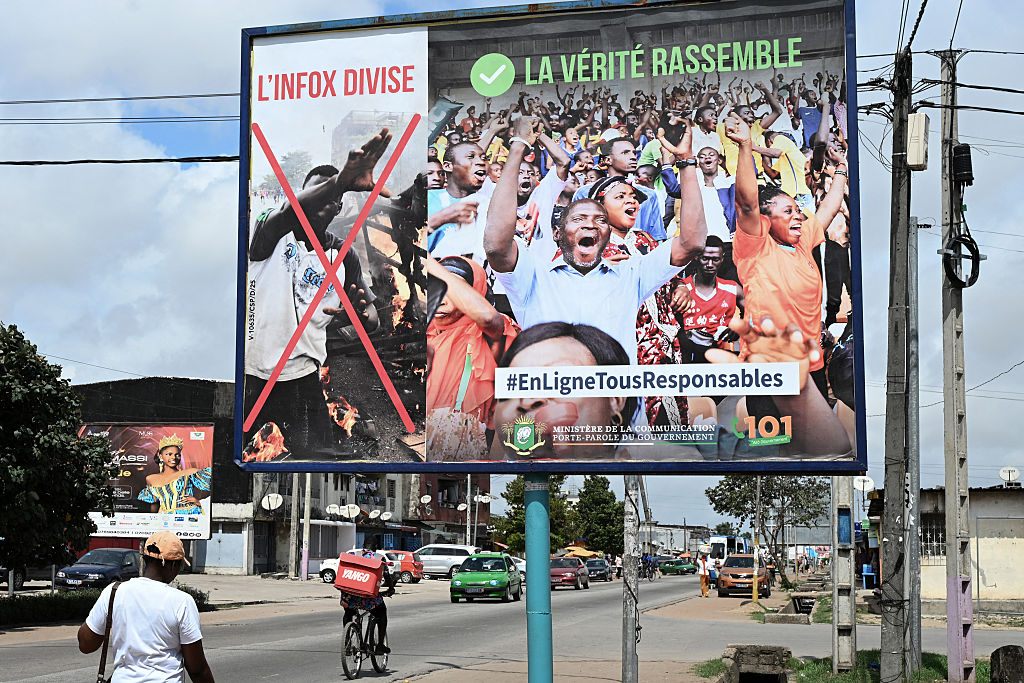In West Africa, Côte d’Ivoire is viewed as a bastion of stability with a strong track record of economic development. Experts believe that is why Russian disinformation operations in junta-led countries of the Sahel have targeted their coastal neighbor’s democratic process.
In August, several social media accounts with tens of thousands of followers spread false reports of violent unrest in the capital, Abidjan, during peaceful protests against President Alassane Ouattara’s reelection bid.
The accounts “attempted to show there had been an insurrection to incite unrest,” Côte d’Ivoire’s National Agency for Information System Security said. “According to our investigations, the accounts responsible for this [disinformation] campaign are mainly identified as having links to Burkina Faso and its supporters.”
A Burkinabe group with 116,000 followers claimed that “gunshots were reportedly heard in the west of the city and dozens of people were killed.”
Ouattara vehemently opposed the coups that brought military juntas to power in Burkina Faso, Mali and Niger. The three countries dropped out of the Economic Community of West African States and created their own Alliance of Sahel States, which is closely aligned with Russia. In March, a disinformation campaign alleged that Ouattara had died. In May, another spread false claims that Ouattara was captured in a coup. Ivoirian Communications Minister Amadou Coulibaly told the BBC that his cybersecurity department traced the fake information to “neighboring countries.”
The Kremlin’s sprawling information-warfare operations helped to further destabilize the Sahel amid rising terrorism, years before coup leaders hired Russian mercenaries.
In February 2023, disinformation networks connected to Russia’s notorious Wagner Group spread rumors of a coup in Niger. In July, the military overthrew the democratically elected president. One month later, the junta appealed to Wagner to send help.
False information helped Russia gain a foothold in the Sahel, and researchers have documented how the Kremlin has helped military rulers in Burkina Faso, Mali and Niger develop their own propaganda operations. Now, they have set their sights on Côte d’Ivoire.
“They are in the eye of the storm,” an official from a West African country told the European Council on Foreign Relations.
“Russia and Russia-trained Burkinabè teams were aiming much of their resources at Ivory Coast ahead of the presidential election there in late October,” Council researcher Will Brown wrote in an October 2025 policy brief. “Moscow has developed a powerful propaganda machine that taps into existing antipathy towards Europe, particularly France, to push African governments closer to its foreign policy objectives.”
The Rapid Intervention Communication Battalion (BIR-C) is a group that shares the Burkinabe military junta’s propaganda on social media.
“Independent analyses and probes have uncovered accounts linked to the … military juntas and in some cases controlled by them, including individuals directly linked to the Burkinabè junta, such as the two brothers of [junta leader] Captain Ibrahim Traore,” a Sahel-based security analyst told Agence France-Presse.
Traore’s younger brother, Kassoum, is in charge of the junta leader’s social media communications. He is suspected of being behind the BIR-C, along with older brother Inoussa, Traore’s special advisor in charge of the digital economy, the analyst said.
Accounts supportive of the military leaders of Burkina Faso, Mali and Niger enthusiastically share critiques of the Ivoirian president, said Jeremy Cauden, co-director of Afriques Connectees, an Abidjan-based online reputation management company.
“The key to the success of the BIR-C is their ability to seize on current events, turn them into distorted and manipulated content and spread this via very active accounts with a huge audience in a coordinated and rapid manner,” he told AFP.
Beverly Ochieng, an analyst at Control Risks consulting company, expects the disinformation blitz to continue.
“Destabilizing the Ivoirian electoral process allows juntas to divert attention from their own [promised political] transitions and justify them continuing to hold onto power by discrediting neighboring democratic alternatives,” she told AFP.

